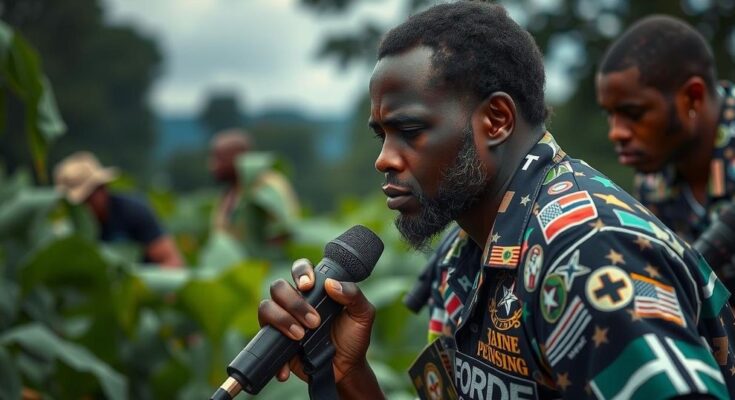The M23 rebel group, backed by Rwanda, has escalated military offensives in eastern DRC, notably in North Kivu province, despite a ceasefire agreement. Local military authorities accuse Rwanda of exploiting this ceasefire for territorial gains. The situation poses a humanitarian crisis and suggests a precarious security environment as clashes between armed groups persist.
Armed groups in eastern Democratic Republic of Congo are intensifying their activities, particularly the M23 rebel militia, which is reportedly backed by Rwanda. Local sources relay that recent offensives have taken place despite a ceasefire agreed upon between the parties involved in early August. The M23 group, after commencing its offensive in late 2021, has been responsible for the capture of extensive areas in the eastern DRC, resulting in significant humanitarian concerns owing to the displacement of thousands of individuals. As clashes escalate, the Congolese military has accused Rwanda of exploiting the ceasefire agreement to establish control over key territories, thus undermining the terms of the truce. The M23 has recently targeted Pinga, a critical town near North Kivu province, and the Wazalendo, a coalition of militias supporting the Congolese Army, has engaged in efforts to repel M23 forces. The DRC military command asserts that they remain compliant with the ceasefire agreement, while condemning the actions of Rwandan-backed forces for their apparent violations. These tensions have prompted reactions from regional stakeholders, including Angola, which has characterized the M23’s actions as a violation of the ceasefire, and France, which has denounced the ongoing military operations by the rebel group. This ongoing conflict represents a culmination of decades of violence in the mineral-rich eastern region of the DRC, marked by the presence of various opposing rebel factions.
The eastern region of the Democratic Republic of Congo has been a hotspot of unrest and violence for over 30 years due to its wealth of natural resources and the presence of numerous rebel groups. The M23 militia, primarily composed of ethnic Tutsi fighters, rose to prominence amid this chaos, accused of receiving political and military backing from Rwanda. The humanitarian situation has deteriorated significantly following their resurgence in 2021, leading to widespread displacement and suffering among local populations. Ceasefires and peace deals have been brokered multiple times; however, violations remain commonplace, with parties involved frequently blaming each other for the stagnation of peace efforts. Recent developments indicate a renewed offensive by the M23, raising concerns regarding stability in the region and the effectiveness of international mediation.
In conclusion, the situation in eastern Democratic Republic of Congo remains precarious as the M23 rebel group continues to challenge a ceasefire agreement purportedly designed to stabilize the region. Accusations of territorial exploitation against Rwanda reflect the complexities underlying regional relations and the ongoing humanitarian crisis. The implications of these conflicts not only highlight the urgent need for sustainable peace strategies but also underscore the prominent role of external forces in exacerbating local tensions.
Original Source: www.barrons.com




